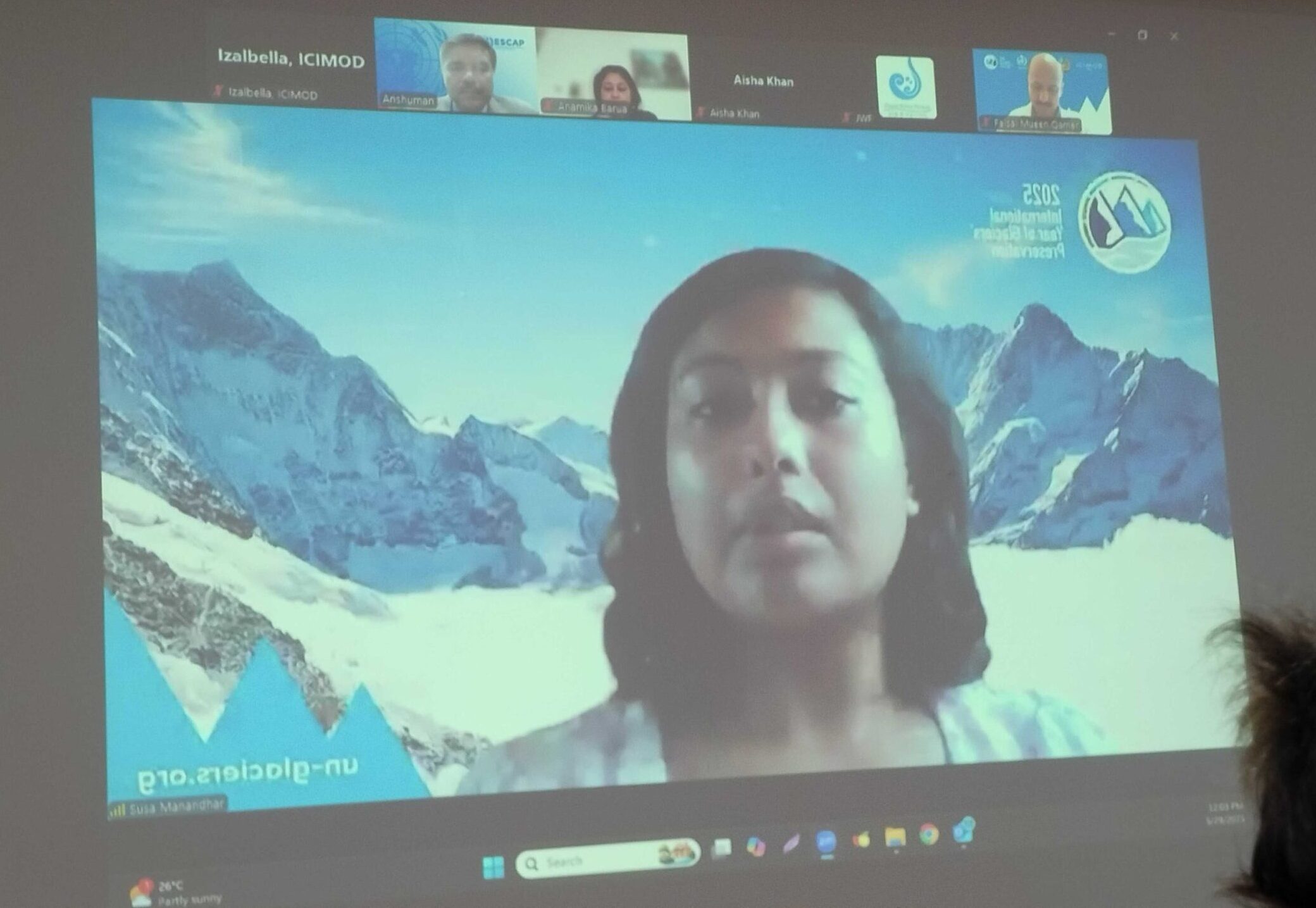The inauguration of the week-long celebration of the Nepal National Water and Weather Week (NNWWW) 2019 was held on March 17, 2019 at the Department of Water Resources and Irrigation (DoWRI), Jawalakhel. More than 200 participants including government officials, representatives from non-governmental organizations (NGOs), academicians, graduate students, entrepreneurs, journalists and general public were present in the event. The event was chaired by Dr. Rishi Ram Sharma, Joint-Secretary of Water and Energy Secretariat (WECS), Ministry of Energy and Water Resources. The Small Earth Nepal (SEN) has been serving as the secretariat for the NNWWW for the past ten years.
The walkathon from Maitighar Mandala to DoWRI was held to campaign World Water Day and World Meteorological in the morning. The theme for this year’s World Water Day is “Leaving no one behind” and for the World Meteorological Day is “The Sun, The Earth and The Weather”. The participants from the walkathon joined the opening ceremony of NNWWW at DoWRI. In the event, reusable water bottle, supported by Water Aid, has been distributed with an aim of imparting a message of ‘reducing the use of plastic bottle’. Also, the top 10 paintings and photographs were exhibited during the opening ceremony at DoWRI.
Er. Mahendra Bahadur Gurung, Executive Director, SEN highlighted the week-long activities that would take place from 17 to 23 March. As pre-week activities of the Water and Weather painting and photography competitions were held. A hike from Rajkulo of Chapagaun to Nepal’s first hydropower station ‘Pharphing Dam’ was held on 16th March. Er. Gurung briefly shared about the activities of the week-long celebration viz. Walkathon, before the inauguration, (17th March), 10th National Groundwater Symposium (18th March), Media Interaction (19th March), National Water Café for college students (18th and 19th March), Graduate Conference on Water (21st March) targeting graduates and early career scientists, thematic workshop on World Water Day (22nd March), and World Meteorological Day Celebration with the closing ceremony (23rd March). Er. Gurung explained that the objective of the week long program is to intensify discussion on water related issues focusing on water and sustainable water resources in Nepal, to make aware related stakeholders, from policy makers to general public on the importance of sustainable management of water, and to bring together the organizations and institutes working in water and environment sectors in a single platform to establish an umbrella organization.
The Hon’ble Minister, Barsaman Pun, Ministry of Water, Energy and Irrigation inaugurated the opening ceremony of the NNWWW-2019 by watering a flower pot. The Minister Pun highlighted importance of multipurpose projects, inter- basin transfer for its sustainable use. He added that immediate actions should be taken for making irrigation feasible in hilly areas through adoption of water lifting technologies so that people are not compelled to migrate downstream for water supply.
Mr. Kalanidhi Poudel, Joint Secretary (WECS), highlighted that proper utilization of water resources should be of a major concern. He stressed that water projects planning should be made discussing with water professionals for sustainable use of water resources.
The Director General of Department of Hydrology and Meteorology (DHM), Mr. Saraju Kumar Vaidya emphasized that extreme climate and weather events have increased in recent decades and stronger evidences confirm that these are consequences of anthropogenic activities.
Ms. Sarita Dawadi, Director General, Department of Water Resources and Irrigation added that research-based activities should be carried out for utilization of waste water in irrigation by collaborating with stakeholders of water sectors.
The Former Minister Mr. Ganesh Shah raised a vital question to all water professionals, “At what price can we get safe drinking water?”He emphasized that water must be accessible to ‘ALL’
Er. Deepak Gyawali, Former Minister and Academician of Nepal Academy of Science and Technology (NAST), pinpointed that the overall capacity of water storage in terms of groundwater, wetland, rainwater harvesting and natural/artificial pond should be increased and economic, ecological, social, and spiritual value of water should be given equal importance. He further exemplified that cultural aspects of water should be given national priority such as Chhat Parva in Terai, Siti Nakha: in the Kathmandu Valley among others.
Er. Madhav Belbase, Secretary, National Vigilance Center, suggested that basin plans are essential for optimum use of water resources.
Dr. Ghana S. Gurung, Country Representative, WWF Nepal showed his concern on hydropower development in Nepal. “The land cover needs to be conserved otherwise it would be difficult to conserve hydropower” he added. He is also interested on protecting water sources such as springs, ponds, and wells for domestic use for mountain dwellers in Nepal.
Dr. Manohara Khadka, Country Representative, International Water Management Institute (IWMI) talked briefly about the contribution of IWMI in water sector in particular, hydro-ecological modelling, research on status of water resources, socio-economic aspects, and water requirement for ecosystem flow including dissemination of their research work to the general people.




